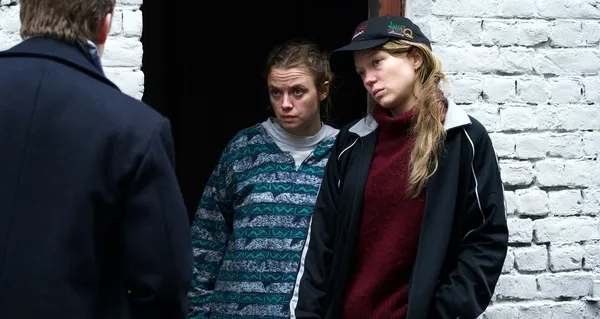Eye For Film >> Movies >> Oh Mercy! (2019) Film Review
Oh Mercy!
Reviewed by: Anne-Katrin Titze

Oh Mercy! (Roubaix, Une Lumière), unlike most crime procedural movies, is never cold. There is a glow of mercy shimmering and pulsating through all the crime reports and investigations and insights. Arnaud Desplechin returns once again to Roubaix, the town in northern France where he grew up. This time around, it is not the slightly magical realm of his childhood (My Golden Days) and fantasies (Ismael's Ghosts: Director’s Cut), but a more realistic place with lots of problems.
Once a booming textile industry capitol, Roubaix now is one of the poorest communities in France with a high crime rate. The police headquarters during Christmas time is the setting where the infallible Commissaire Daoud (Roschdy Zem) holds reign. He is a loner who stayed on when his family returned to Algeria.

Whereas the film, co-written with Léa Mysius, isn’t nostalgic, its protagonist is, as he points out to a new colleague, Lieutenant Louis Cotterel (Antoine Reinartz), the playgrounds he used to love or the lights from Belgium on a starry night on the roof of the hotel where he likes to go for an after-work drink.
Some cases are easier to solve than others. A car set on fire during the impressive opening sequence, will be explained by the owner with such a convoluted, half-baked tale, that it is no problem for Daoud to puzzle together what really happened. Composer Grégoire Hetzel’s enchanting music turns this first eruption of lights into something quite sublime, otherworldly and grounded at the same time. The scene is absurd, funny and warm, despite the fact that it exposes serious bias.
A serial rapist is on the loose, another case of arson, a girl missing - we learn about the police methods and see them interact. Eventually the main case, the heart of the movie, opens up to us. An elderly woman is found dead in her bed in the same poor area of town where one of the fires happened and where Daoud had interrogated two witnesses earlier. Claude (Léa Seydoux) and Marie (Sara Forestier) were the woman’s neighbors and the inspector has his suspicions. What follows is a fascinating row of interrogations to get to the truth, or rather, the truths of what happened that night.
Based on Mosco Boucault’s documentary Roubaix, Commissariat Central, and using the actual interrogation transcripts, Desplechin shoots for a different tone. And yet, of course, Hitchcock is never very far. This time it isn’t Vertigo but The Wrong Man that looms large. Arnaud told me during the New York Film Festival that he had cast and crew watch the 1956 movie with Henry Fonda, before filming began. The master’s versatility and depth allow for manifold inspiration. You might detect a variation on the milk glass from Suspicion, or a killing reenactment reminiscent of Gromek’s demise in Torn Curtain. Both instances are more than winks, as they illuminate connections between storytelling and criminal justice.
How do you deal with a person who is obviously lying to you? What are the ways of fishing for the truth or small truths? Not everyone is as obvious as the arsonist out for insurance money who bundles up all stereotypes and racist sentiments he can find into a ludicrous tale of a turbaned perpetrator with a blowtorch.
Commissaire Daoud is the debonair subject supposed to know. His intuition and empathy make him a master of analysing the narratives he comes across. He is a solitary man who is good with visiting cats and racehorses. And so, which may come as a surprise, is Arnaud Desplechin, who turns out to be wonderful at capturing animals on screen. For the horse scenes, he told me, he took inspiration from Chloé Zhao’s The Rider, a film which manages to capture the divine in the animals’ eyes.
The strangulation of 83-year-old Lucette in her bed sets off the second half of the narrative, which is all about the two main suspects. Seydoux as Claude and Forestier as Marie are equally brilliant and truthful in their vastly dissimilar performances. The costumes by Desplechin’s longtime collaborator Nathalie Raoul (also Paul Verhoeven’s Elle, Cédric Kahn’s Wild Life) help, as Claude, mother of a 6-year-old, more experienced and slightly more worldly, dubbed 'the pretty one', gets to strut around in a black Perfecto, holding on to a Marlon Brando cool in a desperate situation, whereas Marie, permanent frown lines etched into Forestier’s forehead until almost the very end, gets to wear the most pitiful sack-like sweaters.
The all-knowing Daoud gives his interpretation of Claude and Marie’s psyche and tells them, separately, how he understands their lives. His mansplaining says more about him than he is aware of. As the scene of the crime is reconstructed, life goes on in Roubaix. Sometimes the reflection of holiday decorations may look like an earring embellishing the misery for a second, or the lights may form a sparkling noose, forever tightening on a violent world.
Reviewed on: 14 Oct 2019















